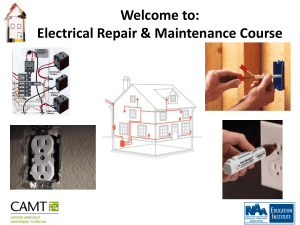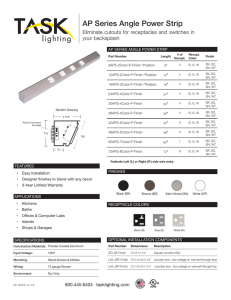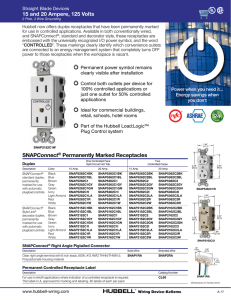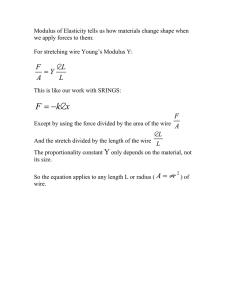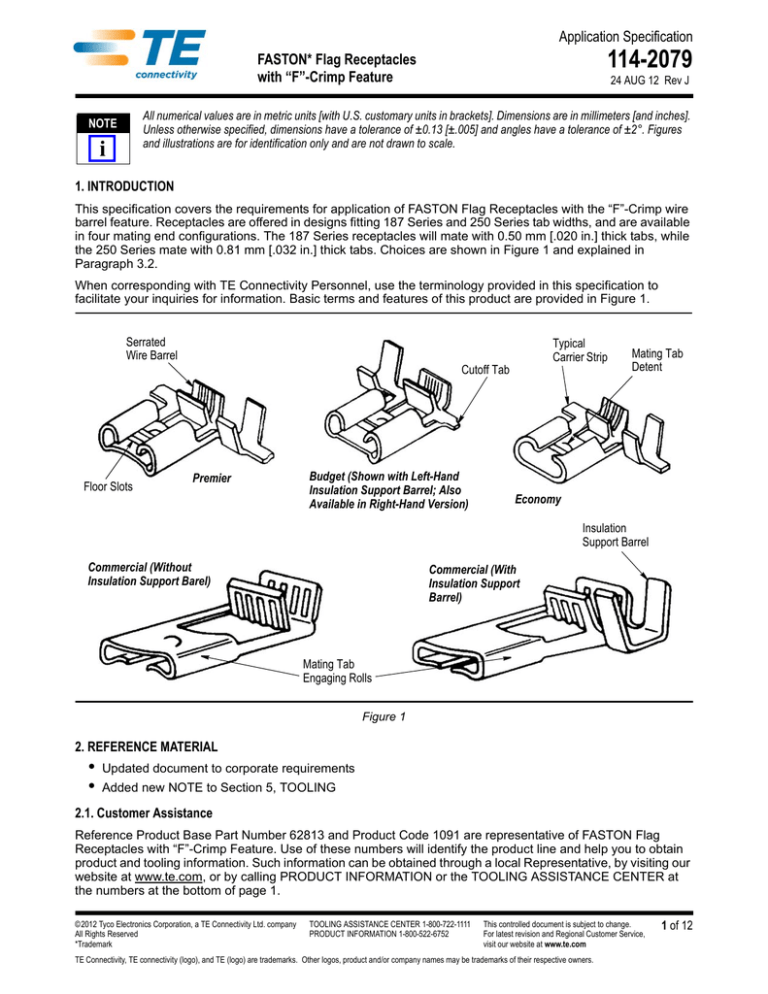
Application Specification
114-2079
FASTON* Flag Receptacles
with “F”-Crimp Feature
24 AUG 12 Rev J
All numerical values are in metric units [with U.S. customary units in brackets]. Dimensions are in millimeters [and inches].
Unless otherwise specified, dimensions have a tolerance of ±0.13 [±.005] and angles have a tolerance of ±2°. Figures
and illustrations are for identification only and are not drawn to scale.
NOTE
i
1. INTRODUCTION
This specification covers the requirements for application of FASTON Flag Receptacles with the “F”-Crimp wire
barrel feature. Receptacles are offered in designs fitting 187 Series and 250 Series tab widths, and are available
in four mating end configurations. The 187 Series receptacles will mate with 0.50 mm [.020 in.] thick tabs, while
the 250 Series mate with 0.81 mm [.032 in.] thick tabs. Choices are shown in Figure 1 and explained in
Paragraph 3.2.
When corresponding with TE Connectivity Personnel, use the terminology provided in this specification to
facilitate your inquiries for information. Basic terms and features of this product are provided in Figure 1.
Serrated
Wire Barrel
Floor Slots
Typical
Carrier Strip
Cutoff Tab
Premier
Budget (Shown with Left-Hand
Insulation Support Barrel; Also
Available in Right-Hand Version)
Mating Tab
Detent
Economy
Insulation
Support Barrel
Commercial (Without
Insulation Support Barel)
Commercial (With
Insulation Support
Barrel)
Mating Tab
Engaging Rolls
Figure 1
2. REFERENCE MATERIAL
•
•
Updated document to corporate requirements
Added new NOTE to Section 5, TOOLING
2.1. Customer Assistance
Reference Product Base Part Number 62813 and Product Code 1091 are representative of FASTON Flag
Receptacles with “F”-Crimp Feature. Use of these numbers will identify the product line and help you to obtain
product and tooling information. Such information can be obtained through a local Representative, by visiting our
website at www.te.com, or by calling PRODUCT INFORMATION or the TOOLING ASSISTANCE CENTER at
the numbers at the bottom of page 1.
©2012 Tyco Electronics Corporation, a TE Connectivity Ltd. company
All Rights Reserved
*Trademark
TOOLING ASSISTANCE CENTER 1-800-722-1111
PRODUCT INFORMATION 1-800-522-6752
This controlled document is subject to change.
For latest revision and Regional Customer Service,
visit our website at www.te.com
TE Connectivity, TE connectivity (logo), and TE (logo) are trademarks. Other logos, product and/or company names may be trademarks of their respective owners.
1 of 12
114-2079
2.2. Drawings
Customer Drawings for specific products are available from the service network. The information contained in
Customer Drawings takes priority if there is a conflict with this specification or with any other technical
documentation supplied by TE.
2.3. Specifications
The following application specifications provide information for the application of related FASTON products:
Document Number
114-2028
114-2032
114-2036
114-2070
114-2078
114-2082
114-2126
Document Title
FASTON 110 Series Flag Receptacles
FASTON Reversible Flag Receptacles
FASTON Straight Receptacles with “F”-Crimp Feature
FASTON AMPLIVAR* Contact Tab
FASTON Flag Receptacles with Tab Lok Feature
FASTON Piggyback Receptacles
FASTON “F”-Crimp Center-Strip Flag Receptacles
2.4. Instructional Material
The following list includes available instruction sheets (408-series) that provide assembly procedures for
operation, maintenance and repair of tooling; and customer manuals (409-series) that provide setup, operation,
and maintenance of machines.
Document Number
408-1851
408-3295
408-7424
408-8024
408-8039
408-8053
408-8059
408-9640
408-9816
409-5128
409-5842
409-5852
409-5878
409-10016
409-10027
409-10029
Document Title
Hand Crimping Tools 90045 and 90162-1
Preparing Reel of Contacts for Application Tooling
Checking Terminal Crimp Height or Gaging Die Closure
Miniature Quick-Change Applicator (End-Feed Type)
Heavy Duty Miniature Quick-Change Applicators (End-Feed Type)
Miniature Quick-Change Applicators
General Preventive Maintenance for Applicators
Crimp Quality Monitor Applicators for Side-Feed and End-Feed Applications
Handling of Reeled Products
Basic AMP-O-LECTRIC* Model “K” Terminating Machines
AMP-O-LECTRIC Model “G” Terminating Machines 354500-[ ]
AMPOMATOR* CLS III-G Lead Making Machine 122500-[ ]
AMPOMATOR CLS IV+ Lead-making Machine 356500-[ ]
Entry Level Terminator (ELT) Machine 1338600-[ ]
Stripping Modules 1490500 and 1490502
Stripping Modules 1490501 and 1490503
3. REQUIREMENTS
3.1. Storage
A. Ultraviolet Light
Prolonged exposure to ultraviolet light may deteriorate the chemical composition used in the receptacle
materials.
B. Reeled Receptacles
When using reeled receptacles, store coil wound reels horizontally and traverse wound reels vertically.
C. Shelf Life
The receptacles should remain in the shipping containers until ready for use to prevent deformation to the
receptacles. The receptacles should be used on a first in, first out basis to avoid storage contamination that
could adversely affect signal transmissions.
D. Chemical Exposure
Do not store receptacles near any chemicals listed below, as they may cause stress corrosion cracking in
the receptacles.
Rev J
2 of 12
114-2079
Alkalies
Amines
NOTE
Ammonia
Citrates
Phosphates Citrates
Sulfur Compounds
Carbonates
Nitrites
Sulfur Nitrites
Tartrates
Where the above environmental conditions exist, phosphor-bronze receptacles are recommended if available.
i
3.2. Product Selection
The FASTON Flag Receptacles with “F”-Crimp feature are available in a variety of series sizes, types of mating
ends, and thicknesses of tabs accepted, as described in Figure 2.
RECEPTACLE THICKNESS AND TAB THICKNESS
RECEPTACLE TYPE
250 SERIES x 0.81 [.032]
LEFT-HAND
RIGHT-HAND
187 SERIES x 0.50 [.020]
LEFT-HAND
Premier with Insulation Support
X
X
---
Budget with Insulation Support
X
X
---
Economy with Insulation Support
X
---
---
Commercial with Insulation Support
X
---
---
Commercial without Insulation Support
X
---
X
Figure 2
Premier - Resilient rolls and a double slotted floor allow maximum compliance toward mating tabs. Each
receptacle is thermally stress-relieved to help resist the effects of overstressing, often caused by production
situations. Premier receptacles also are further processed to clean and lubricate the surface prior to
shipping.
Budget - Construction and characteristics are much the same as the Premier, but the Budget receptacles
have only one floor slot, and do not receive special processing. The 250 Series Budget receptacles are also
constructed of 0.40 mm [.016 in.]-thick material rather than the typical 0.46 mm [.018 in.].
Economy - Distinguishable by a large, flared lead-in and relatively low profile of the mating end rolls.
Commercial - Abbreviated roll construction conserves stock material. These receptacles have generally
higher insertion forces and a somewhat lower tolerance for abuse, allowing use in applications where
undisturbed connections over long periods of time are common.
3.3. Wire Selection and Preparation
This product line will accept wire sizes 0.4-5.0 mm² [22-10 AWG] with an insulation outside diameter range of
1.52-4.06 mm [.060-.160 in.]. Refer to the table in Figure 3 for a more specific listing of wire insulation ranges,
categorized by wire criteria and available receptacle sizes and series.
NOTE
i
CAUTION
The applied crimp dimension (within the functional range of the product) is dependent on the termination tooling being
used. Refer to the documentation (applicator logs and instruction sheets) supplied with the termination tooling for the
applied crimp height. See Section 5, TOOLING.
DO NOT nick, scrape, or cut the wire conductor during the stripping operation.
!
Rev J
3 of 12
114-2079
NOTE: Not to Scale
Stranded Wire
Strip Length
5.15-4.39
[.203-.173]
Insulation
Conductors
RECEPTACLE
TYPE
RECEPTACLE
RECEPTACLE
WIRE
WIRE RANGE
INSULATION
mm² [AWG]
RANGE
WIRE APPLIED
QUANTITY
SIZE
WIRE BARREL CRIMP
HEIGHT
±0.05 [±.002]
WIDTH
(REF)
INSULATION
SUPPORT
CRIMP WIDTH
(REF)
250 SERIES WITH INSULATION SUPPORT
1.22-1.98
[.048-.078]
0.4-0.6
[22-20]
Commercial
2.28-3.55
[.090-.140]
0.4-1.4
[22-16]
Premier,
Budget,
Economy,
Commercial
2.28-3.55
[.090-.140]
or
2.79-5.08
[.110-.200]
0.8-2.0
[18-14]
Premier,
Budget
1.52-2.54
[.060-.100]
0.4-0.8
[22-18]
1
0.2 [24]
1.22 [.048]
1
0.6 [20]
1.30 [.051]
1
0.8 [18]
1.37 [.054]
1
0.4 [22]
1.37 [.054]
1
0.6 [20]
1.42 [.056]
1
0.8 [18]
1.52 [.060]
1
1.4 [16]
1.70 [.067]
1
0.8 [18]
1.47 [.058]
1
1.4 [16]
1.62 [.064]
1
2.0 [14]
1.85 [.073]
1
0.4 [22]
1.17 [.046]
1
0.6 [20]
1.24 [.049]
1
0.8 [18]
1.35 [.053]
1.77 [.070]
2.79 [.110]
1.52 [.060]
2.79 [.110]
4.57 [.180]
2.29 [.090]
250 SERIES WITHOUT INSULATION SUPPORT
Commercial
1.52-4.06
[.060-.160]
3.0-5.0
[12-10]
1
3.0 [12]
2.16 [.085]
1
5.0 [10]
2.57 [.101]
2
2.0 [14]
2.33 [.092]
2
3.0 [12]‡
2.84 [.112]
3.94 [.155]
None
1.77 [.070]
2.79 [.110]
2.28 [.090]
4.06 [.140]
187 SERIES
1.52-1.77
[.060-.070]
0.4-0.8
[22-18]
2.28-3.30
[.090-.130]
0.6-1.4
[20-16]
Commercial
NOTE:
1
0.6 [20]
1.06 [.042]
1
0.8 [18]
1.14 [.045]
1
1.4 [16]
1.27 [.050]
1
0.6 [20]
1.04 [.041]
1
0.8 [18]
1.16 [.046]
1
1.4 [16]
1.34 [.053]
Tabled information refers to all receptacles according to size, series, and stock thickness, rather than
according to type (Premier, Budget, etc.). ‡Stranded conductor only. Others stranded or solid
connector.
Figure 3
Rev J
4 of 12
114-2079
3.4. Crimped Receptacle Requirements
The receptacle must be crimped onto the wire according to instructions packaged with applicable tooling. After
crimping, the receptacle should appear as shown in Figure 4.
CAUTION
The wire insulation must not be damaged during the crimping process.
!
A. Wire Barrel Crimp
The crimp applied to the wire portion of the receptacle is the most compressed area and is most critical in
ensuring optimum electrical and mechanical performance of the crimped receptacle. The receptacle wire
barrel crimp height must be within the dimension provided in Figure 3.
B. Effective Crimp Length
For optimum crimp effectiveness, the crimp must be within the area shown and must meet the crimp
dimensions provided in Figure 3. Effective crimp length shall be defined as that portion of the wire barrel,
excluding bellmouths), fully formed by the crimping tool. Instructions for adjusting, repairing, and inspecting
tools are packaged with the tools. See Section 5, TOOLING.
C. Bellmouths
Front and rear bellmouths shall be evident and conform to the dimensions given in Figure 4.
D. Cutoff Tabs
The cutoff tab shall be cut to the dimensions shown in Figure 4.
Figure 4
Rev J
5 of 12
114-2079
E. Burrs
The cutoff burr shall not exceed the dimensions shown in Figure 4.
F. Wire Barrel Flash
The wire barrel flash shall not exceed the dimensions shown in Figure 4, Section X-X.
G. Insulation Barrel Crimp
The insulation barrel shall grip the insulation firmly. A slight cut in the insulation by the insulation barrel is
permissible as this causes no problems in actual use. Insulation crimp shall comply to width and height
provided in Figure 3.
H. Wire Location
The wire conductor and insulation must be visible in the transition area between the wire and insulation
barrels.
I. Conductor Extension
The conductor may extend beyond the wire barrel to the maximum shown.
J. Wire Barrel Seam
The wire barrel seam must be closed with no evidence of loose wire strands visible in the seam.
K. Twist and Roll
There shall be no twist, roll, deformation or other damage to the mating portion of the crimped receptacle
that will impair usage of the receptacle. See Figure 4.
L. Straightness
The force applied during crimping may cause some slight bending between the crimped wire barrel and the
mating portion of the receptacle. Such deformation is acceptable provided the bending has no effect on
proper mating with the tab terminal.
NOTE
Periodic inspections must be made to ensure crimped receptacle formation is consistent as shown in figure 4.
i
3.5. Crimp Pull-Out Test
Crimped receptacles shall not be separated from their associated wires when subjected to forces as specified in
the following table in Figure 5.
NOTE
Adjust tensile testing machine for head travel of 25.4 mm [1 inch] per minute. Directly and gradually apply force for 1
minute.
i
WIRE SIZE
MINIMUM FORCE
mm²
AWG
NEWTONS
POUNDS
0.4
22
36
8
0.6
20
58
13
0.8
18
89
20
1.4
16
133
30
2.0
14
223
50
3.0
12
311
70
5.0
10
356
80
Figure 5
Rev J
6 of 12
114-2079
3.6. Mating Tab Dimensions
Figure 6 shows features and dimensional requirements for tab terminals intended for mating with FASTON
Receptacles.
TAB SIZE (NOMINAL)
DIMENSIONS
A
B
C
D
E
F
G
H
6.35 x 0.81 [.250 x .032] W/Dimple
0.89 [.035]
7.80 [.307]
0.81 [.032]
6.35 [.250]
3.86 [.152]
4.06 [.160]
1.27 [.050]
8.94 [.352]
6.35 x 0.81 [.250 x .032] W/Hole
0.89 [.035]
7.80 [.307]
0.81 [.032]
6.35 [.250]
4.52 [.178]
3.40 [.134]
1.27 [.050]
8.94 [.352]
4.75 x 0.50 [.187 x .020] W/Dimple
0.76 [.030]
6.22 [.245]
0.50 [.020]
4.75 [.187]
2.54 [.100]
3.81 [.150]
1.14 [.045]
7.36 [.290]
4.75 x 0.50 [.187 x .020] W/Hole
0.76 [.030]
6.22 [.245]
0.50 [.020]
4.75 [.187]
3.18 [.125]
3.18 [.125]
1.14 [.045]
7.36 [.290]
NOTE:
(c) Bevel need not be a straight line if within confines shown, or a radius of G±0.50 mm [±.020 in.]
may be substituted.
(d) Tab shall be flat (0.3 mm²/mm² [.001 inch/inch]); and free from burrs greater than 10% of tab
thickness, or raised plateaus except as noted in Paragraph 3.8.
(e) Dimensional measurements shall not include plating, burrs, or flatness tolerance.
Figure 6
3.7. Tab Retention and Detent Configurations
A tab configuration having no locking feature may be used for applications where low mating retention forces are
desirable. Where higher forces are sought, a tab with a detent meeting the requirements of Figure 7 should be
used. Hole detents provide the greatest retention forces, while dimples provide acceptable medium-range
forces.
Rev J
7 of 12
114-2079
TAB WIDTH (NOMINAL)
J(f)
K(f)
L
6.35 [.250]
2.36 [.093]
1.91 [.075]
1.77 ±0.25/-0.13 [.070 ±.010/-.005]
4.75 [.187]
1.57 [.062]
1.37 [.054]
1.40 ±0.13 [.055 ±.005]
Figure 7
3.8. Mating Overcycle and Testing
The forces required to mate and unmate a test mating tab and receptacle shall be as specified in Figure 8.
Measure the force using a testing device capable of holding the reading. It must also provide accurate alignment
with slow and steady mating and unmating of the test tab and receptacle.
NOTE
i
Testing may be done using a gage as described in Residential Controls--Quick-Connect Terminals, ANSI/NEMA No. DC2-1982. Test tabs shall be dimensioned as shown in Figures 7 and 8, except that the “C” dimension shall have a tolerance
of ±0.007 mm [±.0003 in.] for brass tabs (±0.013 mm [±.0005 in.] for steel) and raised plateaus around detents shall be
limited to a total of 0.025 mm [.001 in.] for both sides.
FORCE (NEWTONS [POUNDS])
TAB SIZE
FIRST MATING
(MAXIMUM)
INDIVIDUAL
FIRST UNMATING (MINIMUM)
AVERAGE
INDIVIDUAL
SIXTH UNMATING (MINIMUM)
AVERAGE
INDIVIDUAL
TEST TAB AND UNPLATED RECEPTACLE
6.35 [.250]
80 [18]
27 [6]
18 [4]
22 [5]
18 [4]
4.75 [.187]
67 [15]
22 [5]
13 [3]
13 [3]
9 [2]
TEST TAB AND TIN-PLATED RECEPTACLE
6.35 [.250]
76 [17]
22 [5]
13 [3]
18 [4]
13 [3]
4.75 [.187]
67 [15]
22 [5]
13 [3]
13 [3]
9 [2]
Figure 8
3.9. Repair/Replacement
CAUTION
!
Rev J
Damaged receptacles must not be used. If a damaged receptacle is evident, it must be cut from the wire and replaced
with a new one.
8 of 12
114-2079
4. QUALIFICATIONS
FASTON Flag Receptacles with ”F”-Crimp Features meet Underwriters Laboratories (UL) 310 specification for
quick-connect terminals, and are Listed in UL Component Listing Program-Electrical File No. E-66717. These
products are also Certified in Files No. LR-49710 and LR-36371-4 of CSA International and also meet NEMA
DC-2 mechanical requirements standard for quick-connect terminals.
NOTE
UL does not qualify this type of terminal when designed for application to 0.2 mm² [24 AWG] or smaller wire.
i
5. TOOLING
This section provides a selection of tools for various application requirements. Modified designs and additional
tooling concepts may be available to meet other application requirements. A list of tooling recommendations and
instructional material packaged with the tooling covering the full wire size range is provided in Figure 9.
NOTE
i
CAUTION
Tool Engineers have designed machines for a variety of application requirements. For assistance in setting up prototype
and production line equipment, contact Tool Engineering through your local TE Representative or call the Tooling
Assistance Center number at the bottom of page 1.
Tool life may be significantly reduced when crimping comparable steel/nickel plated steel terminals.
!
•
Applicators
Applicators are designed for the full wire size range of strip-fed, precision formed receptacles, and
provide for high volume, heavy duty production requirements. The applicators can be used in bench or
floor model power units.
Each applicator is shipped with a metal identification tag attached. DO NOT remove this tag or disregard the information
on it. Also, a packet of associated paperwork is included in each applicator shipment. This information should be read
before using the applicator; then it should be stored in a clean, dry area near the applicator for future reference. Some
changes may have to be made to the applicators to run in all related power units. Contact the Tooling Assistance Center
number at the bottom of page 1 for specific changes.
Power Units
NOTE
i
•
A power unit is an automatic or semi-automatic device used to assist in the application of a product.
Power unit includes the power source used to supply the force or power to an applicator.
•
Hand Tools
Hand crimping tools that accommodate the full wire range are designed for prototype and low-volume
applications such as repair of damaged receptacles.
SERIES
WIRE SIZE
RANGE, AWG
APPLICATOR
(DOCUMENT)
466725-1 408-8039)
22-18
466725-2 (408-8039)
250
466529-1 (408-8024)
22-16
466529-2 (408-8024)
POWER UNIT
(DOCUMENT)
HAND TOOL
(DOCUMENT
122500-2, -3 (409-5852)
356500-1, -2 (409-5878)
565435-5 (409-5128)
1338600-3, -4 (409-10016)
122500-2, -3 (409-5852)
---
356500-1, -2 (409-5878)
565435-5 (409-5128)
1338600-3, -4 (409-10016)
Figure 9 (Cont’d)
Rev J
9 of 12
114-2079
SERIES
WIRE SIZE
RANGE,
AWG
APPLICATOR
(DOCUMENT)
466678-1 (408-8039)
466678-2 (408-8039)
567006-1 (408-8039)
567006-2 (408-8039)
567006-3 (408-8039)
18-14
567300-1 (408-8039)
567300-2 (408-8039)
680613-1 (408-8039)
250
680613-2 (408-8039)
686327-1 (408-8024)
686327-2 (408-8024)
565712-1 (---)
567768-1 (---)
12-10
687060-4 (408-8024)
1385033-1 (408-8039)
10
1385033-2 (408-8039)
POWER UNIT
(DOCUMENT)
HAND TOOL
(DOCUMENT)
122500-2, -3 (409-5852)
356500-1, -2 (409-5878)
565435-5 (409-5128)
1338600-3, -4 (409-10016)
122500-2, -3 (409-5852)
356500-1, -2 (409-5878)
565435-5 (409-5128)
1338600-3, -4 (409-10016)
354500-1, -9, -11 (409-5842)
1338600-1, -2, -5, -6 (409-10016)
---
122500-2, -3 (409-5852)
356500-1, -2 (409-5878)
565435-5 (409-5128)
1338600-3, -4 (409-10016)
122500-2, -3 (409-5852)
356500-1, -2 (409-5878)
565435-5 (409-5128)
1338600-3, -4 (409-10016)
122500-2, -3 (409-5852)
356500-1, -2 (409-5878)
565435-5 (409-5128)
90045 (408-1851)
1338600-3, -4 (409-10016)
1-471273-3 (409-5128)
354500-1, -9, -11 (409-5842)
1338600-1, -2, -5, -6 (409-10016)
565435-5 (409-5128)
1338600-3, -4 (409-10016)
---
122500-2, -3 (409-5852)
356500-1, -2 (409-5878)
565435-5 (409-5128)
1338600-3, -4 (409-10016)
Figure 9 (Cont’d)
Rev J
10 of 12
114-2079
SERIES
WIRE SIZE
RANGE,
AWG
APPLICATOR
(DOCUMENT)
687801-2 (408-8024)
22-18
687801-3 (408-8024)
680176-1 (408-8039)
187
680176-2 (408-8039)
22-16
686262-4 (408-8024)
686262-5 (408-8024)
Hand Tool 90045
POWER UNIT
(DOCUMENT)
HAND TOOL
(DOCUMENT)
122500-2, -3 (409-5852)
356500-1, -2 (409-5878)
565435-5 (409-5128)
1338600-3, -4 (409-10016)
122500-2, -3 (409-5852)
356500-1, -2 (409-5878)
565435-5 (409-5128)
---
1338600-3, -4 (409-10016)
122500-2, -3 (409-5852)
356500-1, -2 (409-5878)
565435-5 (409-5128)
1338600-3, -4 (409-10016)
ELT Machine 1338600-[ ]
with Optional Stripping
Module 1490500-[ ]
Typical Heavy Duty Miniature
Quick-Change Applicator
(End-Feed Type)
AMP-O-LECTRIC
Model “K” Terminating
Machines 565435-5,
1-471273-3
AMP-O-LECTRIC Model
“G” Terminating Machine
354500-[ ] with Optional
Stripping Module 1490501-[ ]
AMPOMATOR CLS
Lead-Making Machines
122500-[ ], 356500-[ ]
Figure 9 (End)
Rev J
11 of 12
114-2079
6. VISUAL AID
The illustration below shows a typical application of this product. This illustration should be used by production
personnel to ensure a correctly applied product. Applications which DO NOT appear correct should be inspected
using the information in the preceding pages of this specification and in the instructional material shipped with
the product or tooling.
WIRE STRANDS AND INSULATION MUST BOTH
BE VISIBLE IN THIS AREA (WHEN INSULATION
SUPPORT BARREL IS PRESENT)
WIRE BARREL SEAM
CLOSED WITH NO
CONDUCTOR
STRANDS SHOWING
BELLMOUTH
MUST BE VISIBLE
CUTOFF TAB MUST
BE VISIBLE (FRONT
AND REAR)
NO DAMAGE TO
MATING AREA
NO EXCESSIVE
WIRE BARREL
FLASH
CONDUCTOR ENDS FLUSH
TO, OR SLIGHTLY BEYOND,
END OF WIRE BARREL
FIGURE 10. VISUAL AID
Rev J
12 of 12

